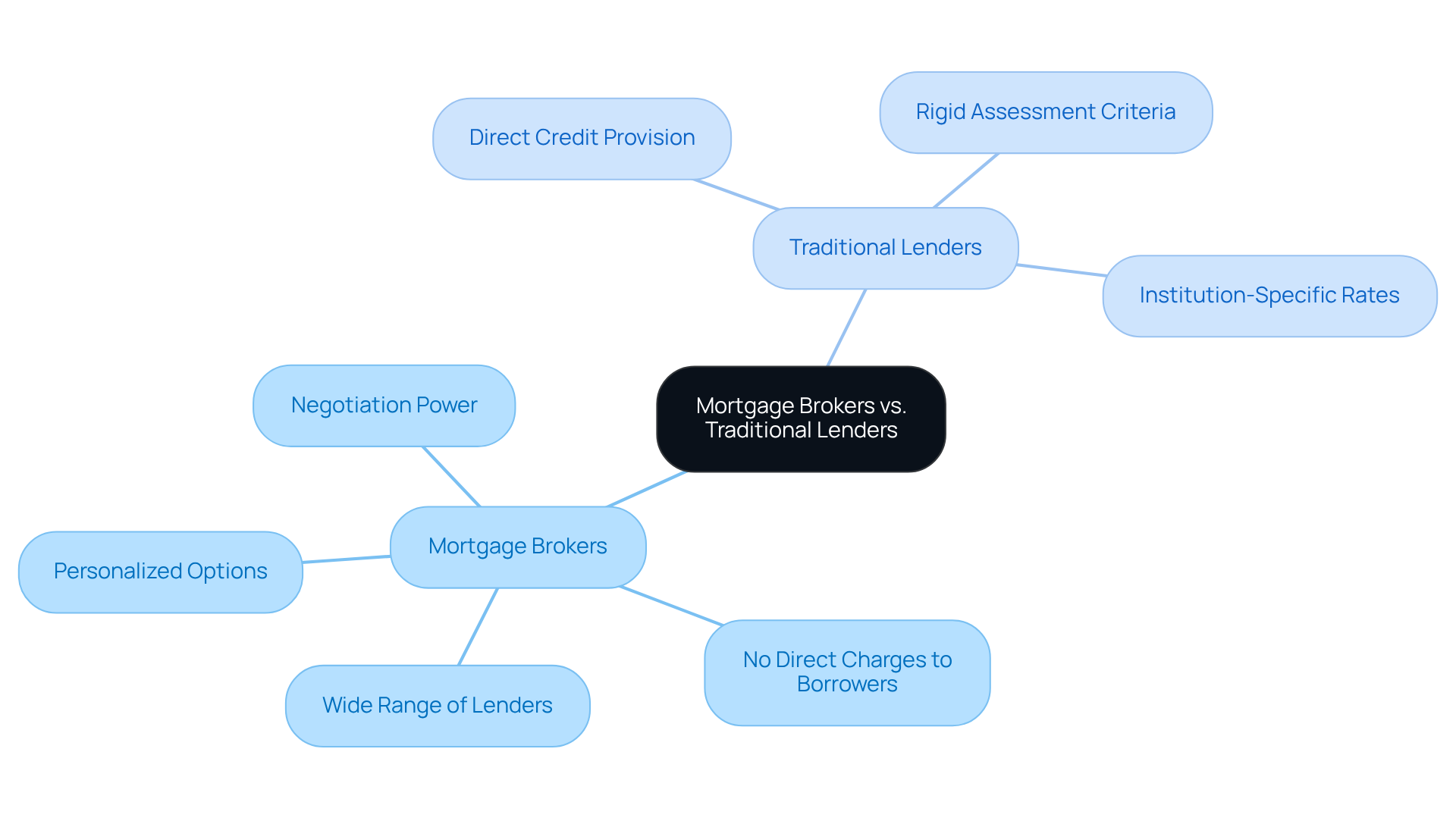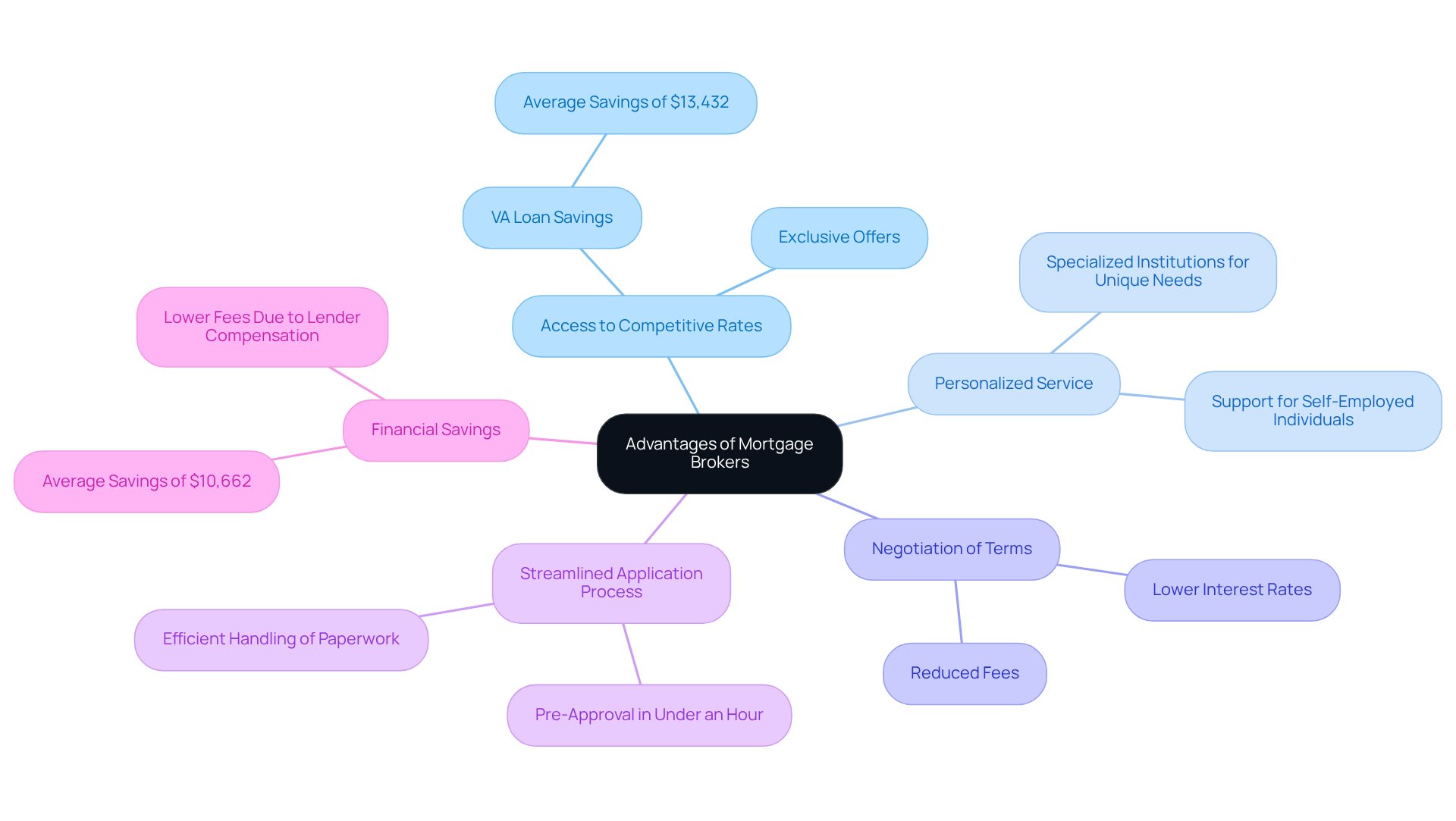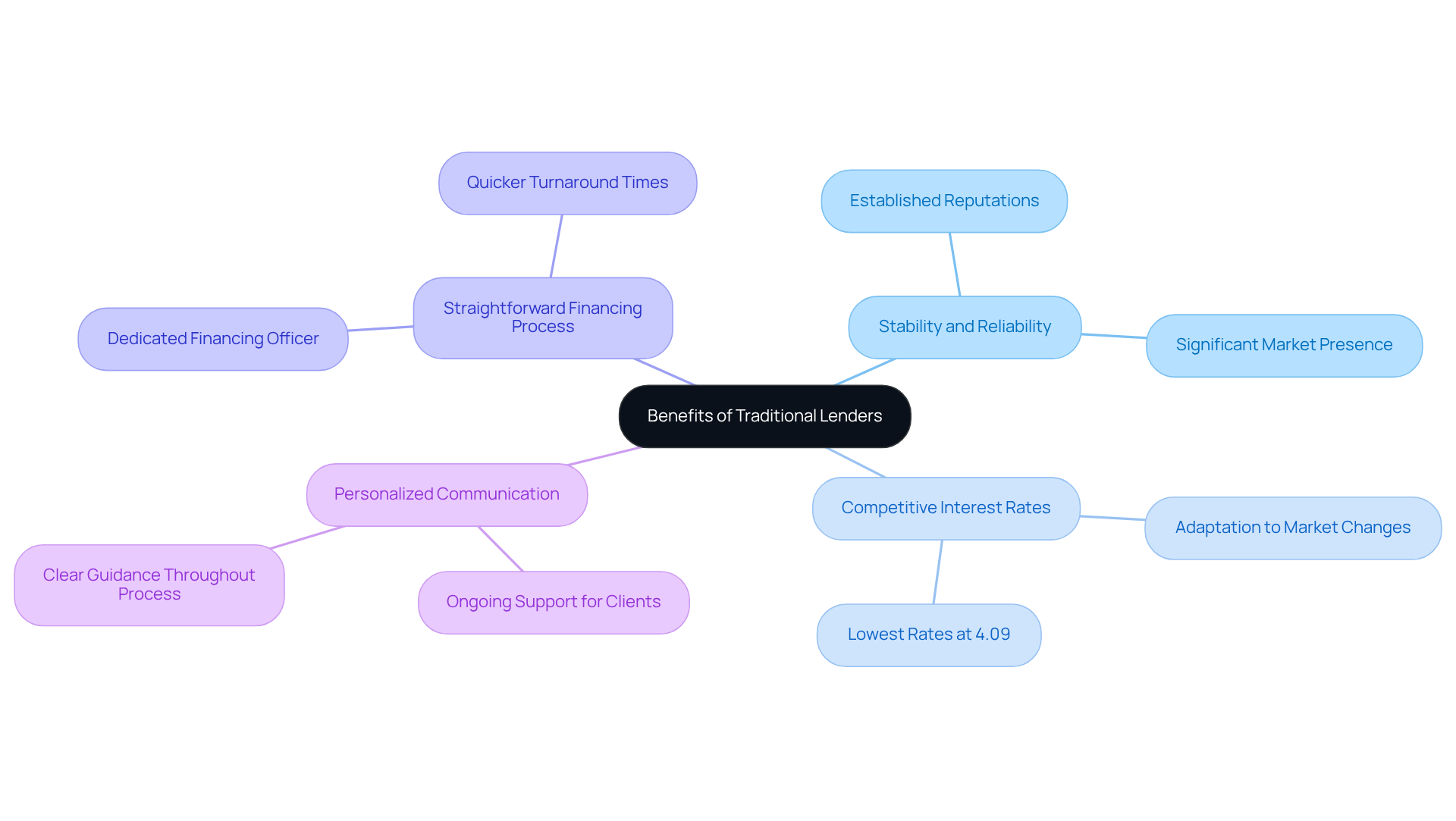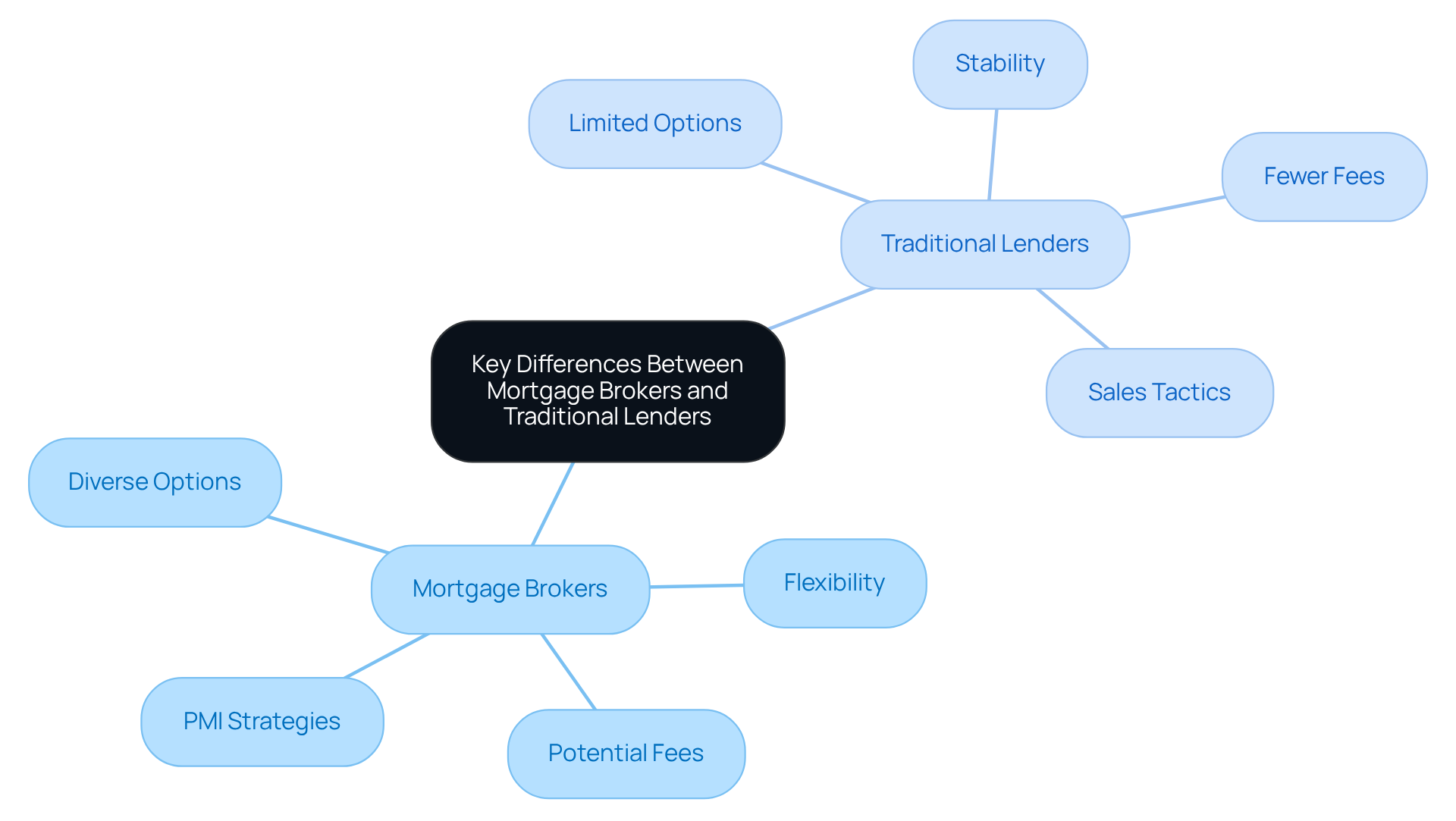Overview
Navigating the world of mortgages can be daunting, and we know how challenging this can be. That’s where mortgage brokers come in, offering significant benefits over traditional lenders. They provide access to a wider array of financing options, personalized services, and potentially better rates through negotiation.
Mortgage brokers excel in catering to your unique needs, ensuring that your specific situation is understood and addressed. They create competitive lending environments that can lead to more favorable terms for you. In contrast, while traditional lenders may offer stability and straightforward processes, they often lack the flexibility and tailored solutions that many families truly need.
We’re here to support you every step of the way, guiding you through the mortgage process with compassion and expertise. By choosing a mortgage broker, you’re not just selecting a financial service; you’re embracing a partnership that prioritizes your goals and aspirations.
Introduction
Understanding the landscape of home financing can feel overwhelming, especially when navigating various options. We know how challenging this can be, and that’s why it’s essential to explore the distinct advantages offered by mortgage brokers.
With mortgage brokers gaining significant traction, accounting for nearly 77% of new residential home financing in 2025, it’s clear that they are becoming a vital resource for borrowers.
As families increasingly seek personalized solutions tailored to their unique financial circumstances, a crucial question arises:
- How do these two pathways differ?
- Which one truly provides the best value in today’s competitive market?
We’re here to support you every step of the way as you make this important decision.
Understanding Mortgage Brokers and Traditional Lenders
Home loan advisors act as compassionate facilitators between borrowers and financial institutions, simplifying the loan process by connecting clients with a diverse array of financing options. Unlike traditional financiers, such as banks and credit unions that provide credit directly and adhere to their own assessment criteria, intermediaries work with multiple lenders to discover the most suitable financing solutions tailored to their clients’ unique needs. This flexibility allows agents to offer personalized options, which can be especially beneficial for first-time homebuyers and individuals with specific financial situations.
In 2025, loan consultants accounted for an impressive 76.8% of new residential home financing, highlighting a growing preference among borrowers for the variety and competitive rates these professionals provide. Industry experts emphasize that intermediaries not only open doors to a broader range of lenders but also negotiate better terms and rates, enhancing the overall borrowing experience. For example, F5 Mortgage has successfully supported over 1,000 families, achieving a remarkable customer satisfaction rate of 94%. This showcases the power of personalized service in the loan landscape.
As the lending environment evolves, loan advisors are increasingly recognized for their vital role in fostering a competitive market, where consumer protections and personalized guidance are paramount. This shift becomes particularly evident as borrowers seek more flexible options in the face of rising interest rates and fluctuating economic conditions. By leveraging their extensive networks and expertise, firms like F5 are transforming the way individuals approach mortgage for brokers, making the home financing process more accessible and less daunting. Importantly, loan facilitators typically do not charge borrowers, as they are compensated by lenders, further highlighting the advantages of utilizing services like F5 Mortgage. Additionally, F5 Mortgage provides tailored mortgage solutions and home refinancing services, ensuring that clients can pursue their homeownership dreams with confidence.

Advantages of Mortgage Brokers
Mortgage consultants provide invaluable support that can greatly enhance your mortgage for brokers experience. They open the door to a wide array of mortgage for brokers from various financial institutions, often resulting in more competitive rates. With their personalized service, these agents help you navigate the complexities of mortgage for brokers, ensuring you understand all your options. This tailored approach is especially beneficial for borrowers with unique financial situations, such as self-employed individuals or those with less-than-perfect credit, as they can connect you with specialized institutions that truly understand your needs.
Moreover, these knowledgeable agents can negotiate terms for a mortgage for brokers on your behalf, potentially securing lower interest rates and reduced fees. For instance, VA mortgage borrowers can save an impressive average of $13,432 per financing option when working with an independent mortgage consultant compared to retail lenders. This ability to obtain better loan conditions through a mortgage for brokers sets intermediaries apart, as they often have access to exclusive offers not available to the general public.
The streamlined application process facilitated by these professionals saves you significant time and effort, allowing you to focus on your home-buying journey rather than getting overwhelmed by paperwork. With F5 Mortgage, for example, you can expect pre-approval in under an hour, making the process efficient and stress-free. Overall, partnering with a loan broker to secure a mortgage for brokers not only simplifies the financing process but also enhances your chances for substantial financial savings. We know how challenging this can be, and we’re here to support you every step of the way.

Benefits of Traditional Lenders
We understand that navigating the lending landscape can feel overwhelming. Traditional lenders, such as banks and credit unions, offer significant advantages that resonate with many borrowers. Their established reputations foster a sense of stability and reliability—qualities that are essential in today’s ever-evolving lending market. In 2025, these institutions are adapting to market changes by providing competitive interest rates, especially for those with strong credit profiles. For example, the lowest home loan rates among Canada’s major banks currently hover around 4.09% for a 5-year fixed-rate loan, making them an appealing choice for many families.
The financing process with traditional lenders is often more straightforward, particularly for conventional mortgages. Borrowers benefit from having a dedicated financing officer as their single point of contact, which facilitates clear communication and guidance throughout the mortgage journey. This personalized approach can lead to quicker turnaround times for straightforward financing, enhancing overall efficiency.
Moreover, the stability of banks and credit unions is underscored by their substantial market presence, with major banks holding significant amounts in real estate loans. Financial analysts emphasize the importance of established institutions in providing secure lending options. As the home financing landscape continues to evolve, conventional financial institutions remain a viable choice for those prioritizing efficiency and a dependable partnership in their journey to obtain a mortgage for brokers. We’re here to support you every step of the way as you explore these options.

Key Differences Between Mortgage Brokers and Traditional Lenders
Understanding the essential differences between mortgage intermediaries and conventional financiers is crucial for families navigating the mortgage for brokers landscape. Mortgage agents serve as trusted middlemen, offering clients access to a diverse range of financing options, including mortgage for brokers, from various financial institutions. This broad selection often results in more competitive rates and tailored services that cater to individual financial situations. In contrast, conventional financial institutions, like banks, provide credit directly, typically offering a more limited selection of products that may not meet the unique needs of every borrower.
We know how challenging this can be. While intermediaries excel in flexibility and negotiation power, allowing them to secure better terms for clients, traditional financial institutions offer a sense of stability and a straightforward process, particularly for mortgage for brokers. It’s important to note that brokers may charge fees for their services, which can affect the overall cost of borrowing. Conversely, conventional financial institutions might impose fewer fees but may provide less competitive rates, especially for borrowers with distinct financial situations. Considering these potential costs is essential when evaluating refinancing options.
Statistics reveal that in 2022, fixed-rate loan products constituted 94% of originations, highlighting the appeal of stable financing options. However, the ability of agents to navigate various lenders often leads to better offers, particularly in a market where 30% of homebuyers reported finding the financing process more challenging than anticipated. This adaptability is vital as the loan landscape evolves, influenced by shifting economic conditions and borrower preferences. Brokers play a significant role in alleviating these challenges by providing mortgage for brokers, along with options, guidance, and real savings without pressure or bias, as noted by industry experts.
Additionally, agents can assist clients with strategies to eliminate private mortgage insurance (PMI) through refinancing, especially in regions like California, where property appreciation rates are high. This can lead to a more favorable loan-to-value (LTV) ratio, allowing homeowners to refinance and potentially eliminate PMI, thus reducing their monthly payments. Furthermore, F5 Mortgage stands out by leveraging technology to offer competitive rates and a consumer-centric approach, ensuring a stress-free experience for borrowers. As the mortgage environment continues to change, influenced by economic factors and borrower choices, the advantages of utilizing a mortgage for brokers, especially one like F5 Mortgage, become increasingly clear. Traditional lenders often rely on hard sales tactics and a veil of secrecy, which can disadvantage consumers, making the choice of a broker even more appealing.

Conclusion
Navigating the landscape of home financing can be overwhelming, and we understand how challenging this can be. It’s essential to recognize the distinct roles of mortgage brokers and traditional lenders, each offering unique advantages to borrowers. Mortgage brokers act as intermediaries, providing access to a wide range of financing options and personalized services tailored to your financial circumstances. On the other hand, traditional lenders, like banks and credit unions, offer a more straightforward application process, delivering the stability and reliability that many borrowers seek.
Key insights reveal that mortgage brokers excel in flexibility and negotiation. They often secure better rates and terms for clients, simplifying the mortgage process—especially for those with unique financial situations. Conversely, traditional lenders provide a sense of security and efficiency, particularly for those with strong credit profiles. The ability of brokers to navigate various lenders and their offerings can lead to significant cost savings, making them an appealing choice for many homebuyers.
As you navigate this complex mortgage market, understanding these differences is crucial. Choosing the right path can lead to a more favorable borrowing experience, whether through the extensive options offered by brokers or the dependable services of traditional lenders. Ultimately, your decision should align with your individual needs and financial goals. We’re here to support you every step of the way, emphasizing the importance of making informed choices in the evolving home financing landscape.
Frequently Asked Questions
What is the role of mortgage brokers?
Mortgage brokers act as facilitators between borrowers and financial institutions, simplifying the loan process by connecting clients with various financing options tailored to their unique needs.
How do mortgage brokers differ from traditional lenders?
Unlike traditional lenders, such as banks and credit unions that provide credit directly and have their own assessment criteria, mortgage brokers work with multiple lenders to find the most suitable financing solutions for their clients.
What percentage of new residential home financing did loan consultants account for in 2025?
Loan consultants accounted for 76.8% of new residential home financing in 2025.
What advantages do mortgage brokers provide to borrowers?
Mortgage brokers offer personalized options, negotiate better terms and rates, and provide access to a broader range of lenders, enhancing the overall borrowing experience.
Can you provide an example of a successful mortgage broker?
F5 Mortgage is an example of a successful mortgage broker that has supported over 1,000 families and achieved a customer satisfaction rate of 94%.
How do mortgage brokers adapt to changing economic conditions?
As interest rates rise and economic conditions fluctuate, mortgage brokers are recognized for their role in fostering a competitive market and providing flexible options to borrowers.
Do borrowers typically pay mortgage brokers for their services?
No, mortgage brokers typically do not charge borrowers, as they are compensated by lenders.
What services does F5 Mortgage offer?
F5 Mortgage provides tailored mortgage solutions and home refinancing services to help clients pursue their homeownership dreams with confidence.








